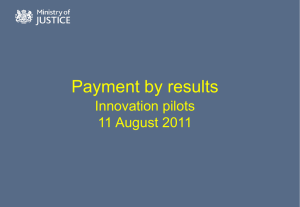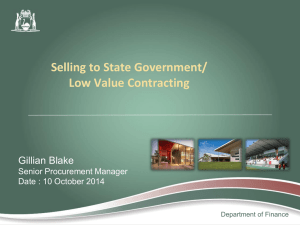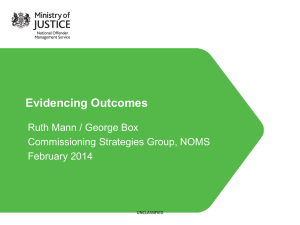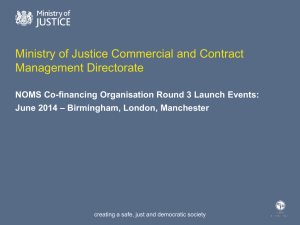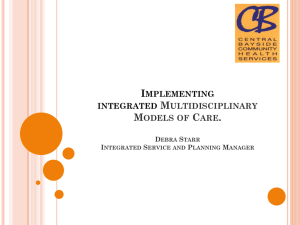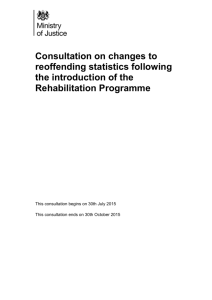Corporate PowerPoint Template
advertisement
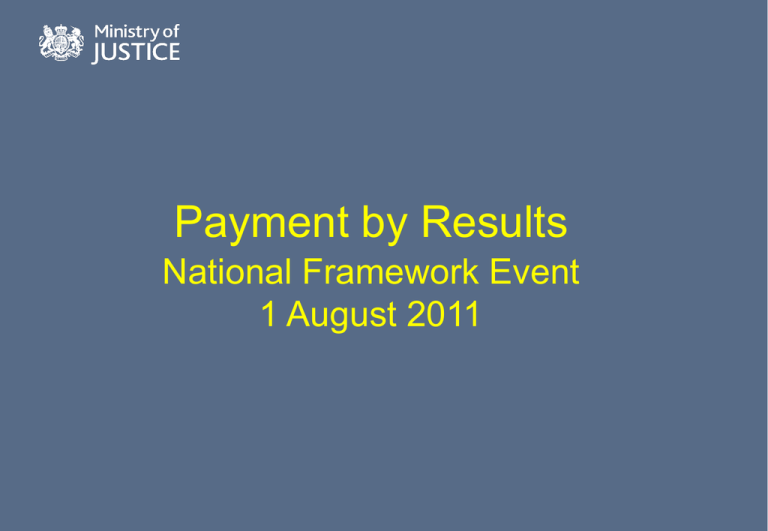
Payment by Results National Framework Event 1 August 2011 Welcome Helen Judge Director, Sentencing and Rehabilitation Ministry of Justice Today’s event •To set out the strategic context and rationale for payment by results •To update you on the payment by results programme •To discuss with you what we are trying to achieve through the community and public sector prison pilots •To set our plans for establishing a National Framework for delivery of the payment by results pilots What have Ministers committed to: • The coalition Agreement stated the Government’s intention to: “pay independent providers to reduce reoffending, paid for by the savings this new approach will generate for the criminal justice system” The Green Paper outlined what this will mean in practice: • New approach paying providers to reduce reoffending • Ambition to apply the principles to all providers by 2015 • At least six new pilots – with innovation pilots on top of this • Supported by wider reforms over the next two years Why are we doing this? To reduce reoffending and increase public safety we must reform the offender management system. This will mean significant changes in the way the Ministry of Justice commissions offender services in partnership with others, and a range of reforms to the delivery system. The critical change we will make to the commissioning system will be to ensure that public money spent on reforming criminals is spent effectively. We will do this by paying service providers for the results that they achieve in reforming offenders. If they are successful, this reduction in crime and reoffending will allow us to make savings in the justice system. Improved outcomes to reduce crime and re-offending should result in fewer victims and safer communities. These reforms are also a central part of the Government strategy to improve public services, deliver the Big Society and ensure that services are more locally focused and accountable to the public. In the justice system this will see us empower communities, open up public services to different types of provider, and encourage social action. The MoJ and NOMS are committed to opening up our public services and creating a more diverse and vibrant market both for rehabilitation services and across our delivery system. What won’t we be able to do today….. …..is answer all your questions. This is new policy for Government, the Criminal Justice System and the providers delivering in the sector We need to develop our thinking together, and today is not just about ‘process’ for procuring services, but to focus on a joint outcome – delivering pilots that reduce reoffending and learning together about what works Without working together across all sectors it will be difficult to harness the expertise and innovation that it will take to be successful…… ……today you will hear more about how you can continue to engage with us Payment by Results Programme Ian Poree Director, Commissioning & Commercial National Offender Management Service Overview • Provide an overview of the Payment by Results programme and an update on progress; • Highlight links with the wider NOMS’ work on competition for offender services; • Provide detail on how some of the financial models currently work within the pilot programme (Lucy Bogue) We have defined 4 pilot types: • Prisons • Offenders on community sentences • Local financial incentives • Innovation Progress to date …. Launched • HMP Peterborough – Social Impact Bond • HMP Doncaster – Private Sector model (to launch October 2011) • Local financial incentive projects – Based on ‘justice reinvestment’ principles in Greater Manchester and across a number of London Boroughs. In progress • We are working with public sector prisons to consider a payment by results pilot; • We are working with probation trusts to consider a pilot working with offenders on community sentences; • We will also consider innovative proposals from the market and explore where best to pilot those ideas. Payment by Results – Wider Context (1) ‘Competition Strategy for Offender Services’ published last month outlines, as well as Payment by Results, further competitions in the first year include: •Custodial competitions. Further nine prisons to be competed this year • Community Competitions. Underway is the competition for community payback services in London. We will hold a competition to replace the existing Electronic monitoring services contracts due to expire in March 2013. Payment by Results – Wider Context (2) The Payment by Results pilot programme is fundamental component of the strategy. It will support us to: • Move away from focusing on how providers deliver a particular service, and concentrate on what outcomes are required from a particular service; • Deliver better outcomes for the taxpayers for less; • Develop a diverse market of potential providers of Offender services • Stimulate providers from all sectors to innovative and better value services. We have committed by 2015 to applying the principles of payment by results across services which reduce re-offending Lucy Bogue Head of Payment by Results Pilot Programme National Offender Management Service Payment by Results – Different models for the different pilots We are keen to use the pilots to explore/test a number of different PbR models. Focus on the following two, as examples: • Social Impact Bond in HMP Peterborough • HMP Doncaster model Peterborough SIB On 10 September 2010, the Government launched a 6-year prototype SIB introducing payment by results into commissioning offender management services. This is how it works: 6. SIB is ‘proof of concept’ but it cuts reoffending and potential to reduce demand & bring cashable savings for MoJ 5. MoJ pays only against this success, to cover costs and provide investor ‘return’ 4. SIB performance measure based on outcomes: to cut reoffending in target group by at least 10% 1. MoJ contract with Social Finance, who find investors from outside Government 2. Social Finance commission proven Third Sector providers to deliver intensive interventions for target offender group 3. Target group is u12 month prisoners discharged from HMP Peterborough Pilot example 2: HMP Doncaster 1. 10% of annual contract value is put at risk against a reoffending target – although the full payment is received in each year Potential extra payment 10 % at risk 10 % recovered by MoJ 10% retained Core budget 2. There will be an offender cohort for each year of pilot –four offender cohorts in total 5. If the 5% point reduction is exceeded, the ‘at risk’ portion is retained by provider, AND additional payments made for every extra % point achieved, capped at 10% points 4. If reoffending is NOT reduced by 5% points from the 2009 baseline, the ‘at risk’ portion for that year returns to the MoJ 3. If reoffending is reduced within a cohort by 5% points from the 2009 baseline, the ‘at risk’ portion for that year is retained by provider Question & Answer ? Policy Development Luke Edwards MoJ Policy, Deputy Director Reducing Reoffending: Payment by Results Introduction The framework will support the Payment by Results programme in delivering: • Public sector prison pilot • 2 x community pilots • Potentially future waves Achieving the Government’s intention to transfer risk away from the public sector Creates new opportunities for the public sector to partner with private and voluntary Delivering the partnerships •Will need to deliver these partnerships in a way that has not been done in our system before •We will use the framework and engagement process to: • bring diversity and innovation to our services, creating new models to more effectively reduce reoffending • ensure that we have providers who are able to stand behind the risk; and • help us think creatively about how this can be achieved Possible ways to deliver….. •Joint ventures •Mutualisation models •Sub contracting arrangements •And … Public Sector selection •We are also identifying the Probation Trusts and public sector prisons •Process includes analytical and leadership criteria •We are: • holding discussions with shortlisted prisons and will select by - end August • holding regional design groups with Probation Trusts, and an application and assessment process will follow this – ends September Working with you….. •We don’t have all the answers yet •We also want to develop the policy with the selected Trusts and Prisons •We will work with all sectors of the market over the coming months to hear ideas about how this might work •We will have all policy detail resolved for the ‘call off contracts’ ready for formal dialogue in relation to the contracts Procurement Process - Payment by Results Clare Maynard Procurement Unit Manager Agenda – To Cover •Procurement Rules and Regulations •Current Position •National Framework Agreement – Process •Mini Competition – Process •Terms and Conditions Background – Responsibilities and Initiatives •Public Procurement Regulations • EU Public Sector Procurement Directive 2004/18/EC • Public Contracts Regulations 2006 • The EU public procurement rules seek to ensure that public sector bodies award contracts based on the principles of transparency, non-discrimination and competitive procurement, and facilitate the achievement of value for money for the taxpayer as well as promoting the single European market •Current Initiatives • Cabinet Office – Efficiency and Reform Group (ERG) • Small and Medium Enterprises (SMEs) • Transparency Agenda - Contract Finder The Current Position •Prior Information Notice • Tenders Electronic Daily (TED) • Ministry of Justice eSourcing Portal (Emptoris) • Further details on Flyer •Market Engagement – consult with recognised market leaders to: • Canvass opinion regarding what existing or new provision may satisfy potential MoJ outsourcing requirements • Establish what options are available to the MoJ/NOMS • Validate assumptions (risks, issues and timescales) regarding potential change and implementation timescales for outsourcing proposals • Understand what key information should be gathered and presented in order to get the best response from the market • Appreciate what external investment opportunities exist and how this would alter commercial arrangements •Commercial Governance and Business Case • Financial and Accountability National Framework Agreement • A framework agreement is a general term for agreements with suppliers which set out terms and conditions under which specific contracts (or “call-offs”) can be made throughout the term of the agreement • When awarding individual contracts under framework agreement, authorities do not have to go through the full procedural steps in the public procurement regulations • It does not mean actual prices will be fixed, rather that there will be a mechanism that will be applied to pricing particular requirements during the period of the framework • Whilst the scope and types of services that will need to be called-off will be set, it allows for flexibility in adapting and refining them for a particular application so long as it remains within the general scope of the original specification • A framework does not represent a contractual commitment, it is the subsequent agreement from the call off which creates the contractual commitment • Maximum duration of four years Procurement Process – Framework •Issue of OJEU Contract Notice - Open Procedures •Issue of Tenders for various lots •Return of Tenders •Evaluation of Responses •Appoint to Framework against lots Key Principles – Mini Competition Process •Run a fair and open competition •Treat all Potential Providers equally and “unfairly” • MoJ and NOMS are fully committed to the principles of competitive neutrality •The Principle of Competition will be developed and issued with tender documents •Support the Merlin Standard approach •All National Framework Providers appointed to a particular lot will be invited to participate in the call off competition Mini Competition Process •Programme will be run by NOMS •Lots enables NOMS to maximise benefits realisation by optimising economies of scale/scope against the balance of local delivery •Gives bidders freedom to innovate, drive down costs and respond to initiatives in the Green Paper •Lots structure still to be determine •Face to face discussion – Our preferred choice COMMERCIAL - RESTRICTED Mini Competition Dialogue – Key Points •Providers will develop their understanding of the requirements over time •Looking for innovation in proposals •Evaluation on the basis of the most economically advantageous tenders, taking into account quality and price •Equal treatment of all bidders Introduction to Competition Documentation •Volume 1 – ITPD Instructions • Background and Competition Process • Contracting Principles • Key Issues • Evaluation Methodology •Volume 2 – ITPD Bidders Response Requirement • Potential Providers Response Requirements •Volume 3 – Terms and Conditions • Framework Agreement • Draft Contract •Volume 4 – Virtual Data Room • Location of background documents •Volume 5 – Site Specific Information Timetable August – one to one engagement September – Issue of OJEU contract notice Mid October – Submission of tenders October/November – Evaluation of tenders December – Award of framework to successful tenders Jan 2012 onwards – Call off process commences Question & Answer ? Closing Remarks Tony Challinor Head of Commercial Development Group National Offender Management Service Innovation Pilots •Ambition is for one or two pilots – depending on nature and size of proposals. • We will be expecting providers to lead on the pilots. Done with and not done to. • Aim is to develop innovative models which are likely to require an external partner/investor; • We will pay on success. £20m has been allocated for success payments across the programme; • August 11th – Innovation Pilots Event
